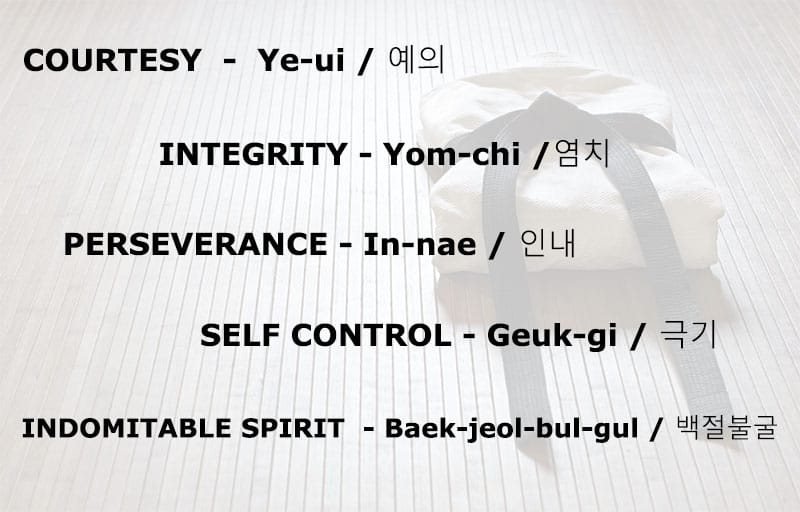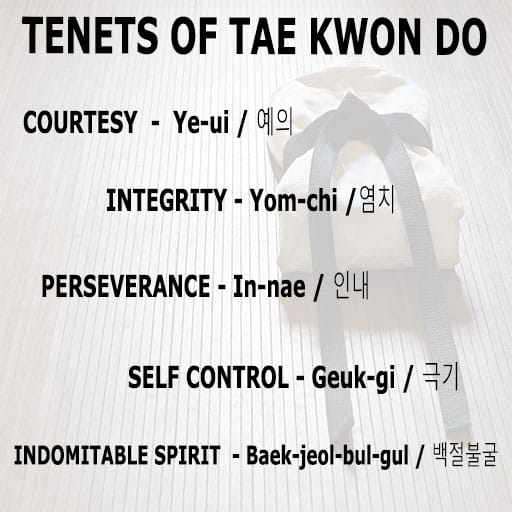
Although in some TaeKwonDo schools the number of tenets may vary depending on what they want the students to adhere to, there are always these 5 essential tenets:
- Courtesy
- Integrity
- Perseverance
- Self-Control
- Indomitable Spirit
But before going into detail about what the 5 tenets of Taekwondo are, I think its best to define what a tenet is before I do anything else: A tenet is an opinion, principle or doctrine that a person holds or maintains as true.
Therefore, I am going to go over these tenets in depth so that you and your family can have a better understanding of the meaning of these core Taekwondo principals.
COURTESY – Ye-ui / 예의
What does the word “courtesy” mean? In simple terms, it’s basically being nice to others. However, it goes beyond this. It also means being respectful of others. In other words, treat others as you would like to be treated, you know.. the golden rule.
This would mean that you would want others to be nice and respectful to you. So you should in turn treat others nicely and respectfully if you wish to be treated that way.
For a child taking TaeKwonDo, all this don’t mean much at first so its best if you can show examples of “courtesy”.
Below are some examples that demonstrate acts of courtesy and that can reinforce this concept.
- Opening a door for someone
- Helping someone pick up their things after they dropped them
- Helping Mom around the house
- Saying “thank you” when someone does something nice to you
- Saying “sir” or “ma’am” when talking to elders
- In a bus, giving up your seat to an older person or someone who can’t stand for an extended period
INTEGRITY – Yom-chi or Jeong-jik / 염치 or 정직
Integrity can mean many things to many different people as there is not only the general definition of integrity where one is able to determine the difference between right and wrong but it is also can mean being able to stand up for what is ethically correct.
Being honest and having strong moral principles is paramount in Tae Kwon Do and working hard to be beyond reproach are important aspects to learn while studying this martial art. One of the meanings that I like to go by is having the quality of being honest and having strong moral principles.
For example, if your son or daughter asks to play a video game and you ask them if they have cleaned up their room or taken the garbage out they should be honest and say yes or no.
Here are just a few other examples of integrity to better explain this tenet:
- Keep your promises even if it takes extra effort.
- Go back to a store and pay for something you forgot to pay for.
- Never betray a friend’s trust even if you get in trouble.
- Inform the cashier he gave you too much change back.
Integrity is important in all aspects of life and is a big part of manners and behavior so make sure you set a proper example for your family and friends.
PERSEVERANCE – In-nae / 인내
Perseverance is that drive that helps you keep working even when you want to quit. What does it mean to me to persevere in Taekwondo? It means doing the small things in warm-up like trying to stretch just a little bit further than the last time, reaching for my toes.
It means going to classes, even when it would be easier to stay at home, particularly on a bitterly cold winter day or an oppressively hot summer day.
Perseverance in relationship to TaeKwonDo is to keep training, through good and bad times, when you’re bored or wondering why you’re doing it, or when you’re just not getting a technique or form.
It’s patiently continuing, knowing you are making progress, even if it’s not visible from the inside.
Some additional examples of Perseverance would be:
- A swimmer practicing every night of the week to win the championship
- A four year old that keeps getting on her bike even though she falls right back off
- Soccer players who practice until dark just to learn a new skill
- A person keeps making posters to put a stop to bullying even though others keep tearing them down
It is only through perseverance that we acquire our skills and then hone them. As they say, “If at first you don’t succeed, try, try, try again”
SELF CONTROL – Kuk Chi / 극기
Self-Control can be defined as: The ability of one to function in the world today without losing patience or displaying ill-temper or anger towards another.
Self-control, like any other positive attribute, cannot be developed in a day or two. Nor can it be developed solely by martial arts training.
To have control over yourself and your actions, you also need to be motivated – you should feel the need for control from within.
As it relates to TaeKwonDo Self-control can seem pretty self-explanatory, but it’s basically control of one’s self during sparring and training.
A few examples of self-control that we can see in our daily lives are:
- When we don’t respond to the person instigating us of something which is for their benefit
- When we are on the verge to lose our calmness and coolness but then realize to keep silence
- Concentrating on our life and how we should lead it and what we want from it rather seeing what others want from it
Self-control comes from having respect for one another. Through understanding the importance of respect for everyone around us our self-control cannot fail to improve.
I think Lao Tzu the great Chinese philosopher summarized the importance of self-control the most eloquently when he said:
“the term of ‘stronger’ refers to the person who wins over oneself rather than someone else”
INDOMITABLE SPIRIT – Baekjul Boolgool / 백절불굴
The definition I like to use for Indomitable Spirit is not giving in when things go against you and/or the application of will in order to overcome failure. One may not always succeed on the first try at everything that one attempts in TaeKwonDo, or in life.
The student with indomitable spirit has the courage and confidence to try again and not be subdued or overcome in the face of fear or failure.
It is shown when a courageous person and his principles are pitted against overwhelming odds.
One of the greatest examples of indomitable spirit comes from Thomas Edison, the inventor of the lightbulb.
Did you know he failed more than 10,000 times (I am still amazed at that number!) before he created the light bulb? For me, that makes him a true example of perseverance.
There are many other examples out there that include staying true to your beliefs even against adversity, setting and achieving challenging goals, and looking for the positive rather that the negative in everything.
So you should ask yourself how do I get to have an Indomitable Spirit? Do you allow your spirit to be broken or do you keep pushing even though everything seems to be against you.
You may fall down 7 times but remember you CAN get back up again. A serious student of TaeKwonDo will at all times deal with the belligerent, without any fear or hesitation, with indomitable spirit regardless of whosoever or however many the number may be.
Final Thoughts
Every one of these 5 tenets are very important in being a TaeKwonDo Student. The moment I step out my door or into my TaeKwonDo school, I try to embody all of these characteristics as I know that being an older individual, the younger students may be looking at me to set the example.
I try to always keep in mind that Character is about who you are when no one’s looking and these tenets are all about who we are when people are watching and the lights are on you.
In the long run, these tenets not only help these young students but myself as well in to boosting our performance in each and every class, and that will make all of us better people in the end.


